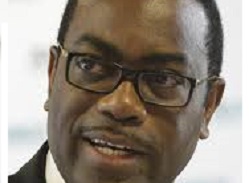Since the Dakar 2 Summit, six African countries have set up Presidential-level Councils to drive implementation of the Country Food and Agriculture Delivery Compacts agreed at the summit, while another twelve countries are at various stages of establishing their councils.
Presidential Councils have taken off in Tanzania, Democratic Republic of Congo, Central African Republic, Nigeria, Sierra Leone, and Zambia, while the councils in Benin, Burundi, Chad, Cote d’Ivoire, Cameroon, Ethiopia, Egypt, Ghana, Guinea-Bissau, Senegal, Malawi, and Togo are in the process of operationalization.
African Development Bank Group president, Dr Akinwumi Adesina announced this on Monday 27 May, in Nairobi, Kenya, at an event on the sidelines of the 2024 Annual Meetings, to take stock of the progress made since the Dakar 2 Summit which was convened by the Bank and the Senegal government in January 2023.
At that summit, $72 billion was mobilised for agriculture development and transformation across Africa. Now the Bank has committed to invest $2.9 billion to support these Compacts, and also appointed two Special Envoys to coordinate and support the Presidential Delivery Councils.
In his remarks, Adesina identified various obstacles to Africa’s ability to feed itself, including climate change, global volatility of food prices, and geopolitical shocks. He reiterated the Bank’s commitment to investing $25 billion over a ten-year period to increase food production and bolster the continent’s agricultural resilience.
Adesina concluded with five important “needs” required for agricultural transformation in Africa: the need to raise agricultural productivity; the need to significantly expand private sector financing for agriculture; the need for younger farmers in the agriculture sector; the need for significant policy support to de-risk agriculture financing; and the need for effective collaboration and cooperation.
He cited examples of the Bank Group’s ambitious interventions to address these needs, like the Technologies for African Agricultural Transformation (TAAT) programme, African Emergency Food Production Facility, Africa Fertilizer Financing Mechanism, Agri-food SME Catalytic Financing Mechanism, and Special Agro-Industrial Processing Zones (SAPZs) program.
Following Adesina’s opening remarks, there were two panel discussions, moderated by Dr. Victor Oladokun, Senior Advisor to the Bank President for Communication and Stakeholder Engagement.
The first panel focused on “Food and Nutrition Security progress post Dakar 2.”
Sierra Leone’s Minister of Finance, Sheku Ahmed Fantamadi Bangura highlighted the work of the multi-stakeholder Presidential Council set up to oversee the implementation of Sierra Leone’s Compact: “We believe agriculture is the entry point for real development intervention in Sierra Leone,” he said.
Angola’s Minister of Planning, Victor Hugo Guilherme disclosed that Angola’s Long-term Development Strategy (“Vision 2025”) identifies food security as a leading priority. He said the government is financing the provision of modern agriculture tools to address the low productivity of Angola’s smallholder farmers who account for 99% of all cultivated land in the country.
Bärbel Kofler, Parliamentary State Secretary of the German Federal Ministry for Economic Cooperation and Development (BMZ), and the Bank’s Governor for Germany, also touched on the productivity issue: “If you want to feed Africa, you need to raise the productivity of smallholder farmers.”
The second panel, featuring representatives of four organisations involved in agriculture investment partnerships with the African Development Bank, examined “partnerships, resources mobilization and private sector investments post Dakar 2.”
Donal Brown, Associate Vice-President, International Fund for Agricultural Development (IFAD) stressed the importance of collaboration, citing the example of the Mission 1 for 200 (M1-200), as well as the $538 million co-financing between the Bank, IFAD and the Islamic Development Bank to develop Special Agro-Industrial Processing Zones in Nigeria.
Gwen Mwaba, Director & Global Head, Trade Finance, African Export–Import Bank highlighted the role of trade financing as a “great facilitator” for supporting Africa’s food security and resilience. She shed light on Afreximbank’s “trade guarantee” options for exporters and counterparties, as well as its financing support for the procurement and production of fertilizers by African countries.
George Olaka, Chief Financial Officer, Arise Integrated Industrial Platforms (Arise IIP) shared the company’s approach of partnering with multilateral financial institutions like the African Development Bank, Afreximbank, the Africa Finance Corporation (AFC), as well as African governments, to build and operate industrial parks and zones to improve production, value-added logistics, and intra-African trade.
Daniel Huba, Vice President, Mastercard, spoke about the new “Mobilizing Access to the Digital Economy (MADE) Alliance: Africa” initiative, launched this month as a partnership between the African Development Bank and Mastercard. This will provide 100 million small-holder farmers Africans with trusted digital credentials to improve their access to credit.
In her closing remarks and vote of thanks, Beth Dunford, the Bank’s Vice President for Agriculture, Human and Social Development, said: “What Dakar 2 shows is really the importance of country leadership. Through the Country Food and Agriculture Delivery Compacts, that have charted the path for accelerated and focused investment, and agricultural transformation, the results are really showing.”
Her words echoed President Adesina’ s verdict on the success of the Dakar 2 Summit: “Political will is what you need to be able to feed Africa. That was clearly in action [at the Dakar 2 Summit] in Senegal. It was a demonstration of huge political will towards Africa being able to feed itself.”

